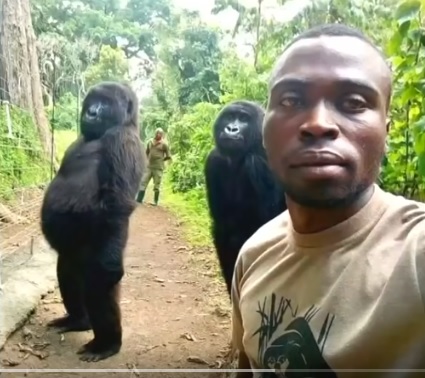Two orphaned gorillas named Ndakazi and Ndeze, mimicked the movements of an African park ranger in Virunga national park in the Democratic Republic of the Congo for a “selfie.” Although they forgot to suck their bellies in, their photo went viral.
Africa’s oldest national park, Virunga is home to approximately 1,000 mountain gorillas. With their location in eastern DRC, these gorillas, including the rangers who protect and care for them, are always in danger against poachers, illegal charcoal smugglers and the Mai-Mai militias who threaten their survival.
According to rangers at the sanctuary, Ndakazi and Ndeze were the first to be cared for at the Senkwekwe Mountain Gorilla Orphanage Centre, the only one of its kind in the world. Nkakazi and Ndeze were orphaned 12 years ago when their families were killed by poachers.
Because the gorillas have such close contact with rangers and caretakers from a young age, they learn to imitate humans.
“In terms of behaviour, they like to mimic everything that is happening, everything we do,” Shamavu said. He said the caretakers at the orphanage try to give the animals as much access as possible to their natural environment, but they inevitably exhibit “almost the same behaviour as humans.” They need constant care, so the rangers live nearby and spend their days feeding them, playing with them and keeping them company.
“Gorilla caretakers with those gorilla orphans, we are the same family,” said Andre Bauma, the head caretaker. “They know we are their mum. They are a member of the family. We are their friends.”
Virunga is Africa’s most bio-diverse national park, spanning tropical forests, snow-peaked mountains and active volcanoes. It is also one of the last homes of wild mountain gorillas, with other wild populations elsewhere in the Congo, Rwanda and Uganda.
Virunga’s management has had to take extraordinary measures to keep its visitors safe from the sporadic fighting in the region – protecting them with a highly trained guard of elite rangers and sniffer dogs, as well as working closely with communities surrounding the park.
The park, which relies on private visitor donations, used its “gorilla selfie” moment in the spotlight to help raise funds, reaching its $50,000 (£39,000) target to mark Earth Day.

